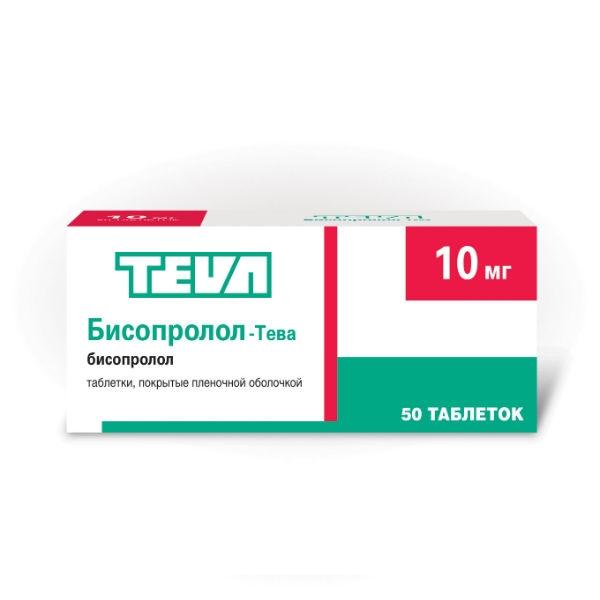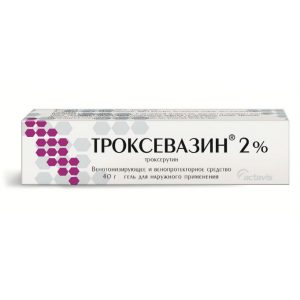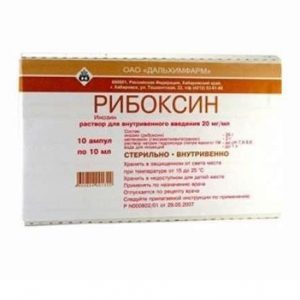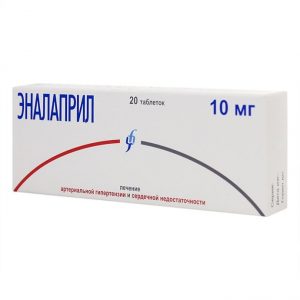Description
Latin name
Bisoprolol-Teva
Release form
film-coated tablets.
packaging 50 pcs
Pharmacological action
Bisoprolol-Teva has an antianginal, antiarrhythmic, hypotensive effect.
Indications
Arterial hypertension, angina pectoris, post-infarction period, arrhythmias, chronic heart failure (moderate, stable without exacerbation during the last 6 weeks).
Contraindications
Hypersensitivity, sinus bradycardia (less than 45-50 beats / min), sinus node syndrome, sinoatrial and AV block II III degree, cardiogenic shock, acute and refractory to treatment severe heart failure, myocardial infarction, acute hypotension (SBP below 90 mm Hg), severe obstructive respiratory failure, pregnancy, lactation.
Use during pregnancy and lactation
It is possible if the expected effect of the therapy on the mother outweighs the potential risk to the fetus and the baby (adequate and strictly controlled studies of the safety of use in pregnant and lactating women have not been conducted). Since there is a risk of developing bradycardia, hypotension, hypoglycemia, and respiratory distress (neonatal asphyxia) in newborns, treatment with bisoprolol fumarate should be discontinued 48 ² 72 hours before delivery. If this is not possible, the newborn should be under close medical supervision for 48 ² 72 hours after birth. The secretion of bisoprolol fumarate with breast milk has not been studied, but since it is secreted into breast milk in rats (less than 2%), infants should be under medical supervision.
Composition
1 tablet contains bisoprolol fumarate 10 mg excipients: croscarmellose sodium (primellose), povidone (polyvinylpyrrolidone medium molecular weight), pregelatinized starch (starch 1500), silicon dioxide colloidal sucrose, cellulose microcrystalline sucrose (cellulose microcrystalline sucrose) , magnesium stearate film coating composition: Opadry II (polyvinyl alcohol, partially hydrolyzed, titanium dioxide, talc, macrogol (polyethylene glycol 3350), iron dye oxide (II)).
Dosage and administration of
Bisoprolol-Teva is taken orally, without chewing, with a small amount of liquid, in the morning on an empty stomach or during breakfast 1.25-10 mg once a day. The dosing regimen is individual, the dose is increased under the control of blood pressure and pulse. Arterial hypertension and angina pectoris: 5 10 mg mild arterial hypertension (dAD less than 105 mm Hg): 2.5 mg chronic heart failure: 1.25 mg / day (for 1 week), then with good tolerance the dose increase to 2.5 mg / day (1 week), 3.75 mg / day (1 week), 5 mg / day (4 weeks), 7.5 mg / day (4 weeks), then 10 mg / day (target dose). The maximum daily dose for adults is 20 mg.
Side effects
Frequency: very often (more than or equal to 1/10) often (more than 1/100, less than 1/10) infrequently (more than 1/1000, less than 1/100) rarely (more than 1/10000, less than 1 / 1000) is very rare (less than 1/10000, including individual messages).
From the nervous system: infrequently – increased fatigue, asthenia, dizziness, headache, drowsiness or insomnia, depression, rarely – hallucinations, nightmares, cramps.
On the part of the sensory organs: rarely – impaired vision, decreased secretion of lacrimal fluid, dryness and soreness of the eyes very rarely – conjunctivitis.
From the CCC: very often – sinus bradycardia, often – decrease in blood pressure, manifestation of angiospasm (increased disturbance of peripheral circulation, cooling of the lower extremities, paresthesia), infrequently – violation of AV conduction, orthostatic hypotension, decompensation of heart failure, peripheral edema.
From the digestive system: often – dryness of the oral mucosa, nausea, vomiting, diarrhea, constipation rarely – hepatitis.
From the respiratory system: infrequently – difficulty breathing when prescribed in high doses (loss of selectivity) and / or in predisposed patients – laryngo- and bronchospasm rarely – nasal congestion.
From the endocrine system: hyperglycemia (in patients with non-insulin-dependent diabetes mellitus), hypoglycemia (in patients receiving insulin).
Allergic reactions: rarely – itching, rash, urticaria.
From the skin: rarely – increased sweating, flushing of the skin, very rarely – psoriasis-like skin reactions, exacerbation of symptoms of psoriasis, alopecia.
From the musculoskeletal system: infrequently – muscle weakness, cramps in the calf muscles, arthralgia.
Laboratory indicators: rarely – increased activity of hepatic transaminases, hypertriglyceridemia, in some cases – thrombocytopenia, agranulocytosis.
Effect on the fetus: intrauterine growth retardation, hypoglycemia, bradycardia.
Other: impaired potency, withdrawal syndrome (increased angina attacks, increased blood pressure).
Drug Interaction
Likelihood of Automatic Disorders, conduction and contractility of the heart increases (mutually) against the background of amiodarone, diltiazem, verapamil, quinidine drugs, cardiac glycosides, reserpine, alpha-methyldopa. Concomitant administration of calcium dihydropyridine antagonists, especially in patients with latent heart failure, increases the risk of hypotension and decompensation of cardiac activity. Efficiency is reduced by xanthines and sympathomimetics, rifampicin decreases T1 / 2, ergotamine derivatives potentiate peripheral circulation disorders. Incompatible with MAO inhibitors.
Overdose
Symptoms: bradycardia, arrhythmia, hypotension, heart failure (shortness of breath, acrocyanosis, edema), hypoglycemia, in severe cases – collapse.
Treatment: gastric lavage and the appointment of adsorbing agents, symptomatic therapy: atropine, beta-adrenomimetics (isoprenaline), sedatives (diazepam, lorazepam) and cardiotonic (dobutamine, dopamine, epinephrine, norepinephrine, glyporephrine glucagon, etc. In the blockade of the heart – transvenous stimulation, the connection of an artificial rhythm driver.
Storage conditions
The drug should be stored in a dry, protected from light, out of reach of children at a temperature not exceeding 25 ° C.
The Expiration of
is 3 years.
active ingredient
bisoprolol
Pharmacy leave
Po
Dosage form
dosage form
tablets




